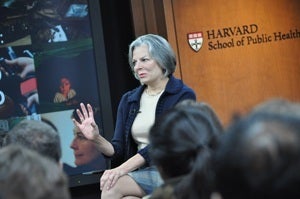November 2, 2011 — Always have a goal and know where you are headed, Julie Gerberding, former director of the U.S. Centers for Disease Control and Prevention (CDC), told Harvard School of Public Health (HSPH) students October 27, 2011. She shared leadership tips at the Division of Policy Translation and Leadership Development’s lecture series, “Decision-making: Voices from the Field.”
Watch the video of Gerberding’s talk.
Whether managing a public health crisis or an organization, setting goals is key to getting things done. “I haven’t spent a day in my life since age 4 without a goal. I knew I wanted to be a physician every day,” Gerberding said.
Raised in a small South Dakota town, Gerberding achieved her career goal and became a physician specializing in infectious diseases. In 2002 she was appointed the first female CDC director. As head of the agency, she was responsible for coordinating emergency response initiatives for anthrax bioterrorism, SARS, avian influenza, natural disasters, and other public health crises. She left the CDC in 2009 and last year became president of Merck’s vaccine division.
“Your experience has been extraordinary—from extended leadership in academic institutions to leadership in government and the private sector,” said program moderator Leonard Marcus, lecturer on public health at HSPH, and co-director of the National Preparedness Leadership Initiative (NPLI). Marcus and Gerberding have discussed leadership since 2003 when Gerberding came to Harvard to help launch the NPLI, whose mission is to equip the nation’s leaders with skills and knowledge to lead during crisis.
Gerberding’s leadership advice for the students centered on what she calls “The Four Ds”:
- Destination: “If you know where you are going, you will know what to do,” she said. One of the most important challenges for leaders, she said, is making sure those you lead are clear about your organization’s “strategic intent.”
- Development: “You have to continuously learn and evolve as you go,” Gerberding said. She encouraged the students to learn from mentors and encourage others to develop their skills by giving them opportunities to shine.
- Discipline: Having discipline to carry out what you have to do is one of the most difficult aspects of leadership, she said. “It’s easy to have vision and goals. It’s not so easy to have the discipline to execute them,” she said.
- Determination: This is the most important “D” because it motivates people to take action, Gerberding said. Leaders must learn “to engage people’s hearts, not just their brains and their pocketbooks, in the steps that need to be taken,” she advised. “Be the accelerator pedal because there are many people in the organization who are the brakes,” she said.
—Marge Dwyer
photo: Aubrey LaMedica
